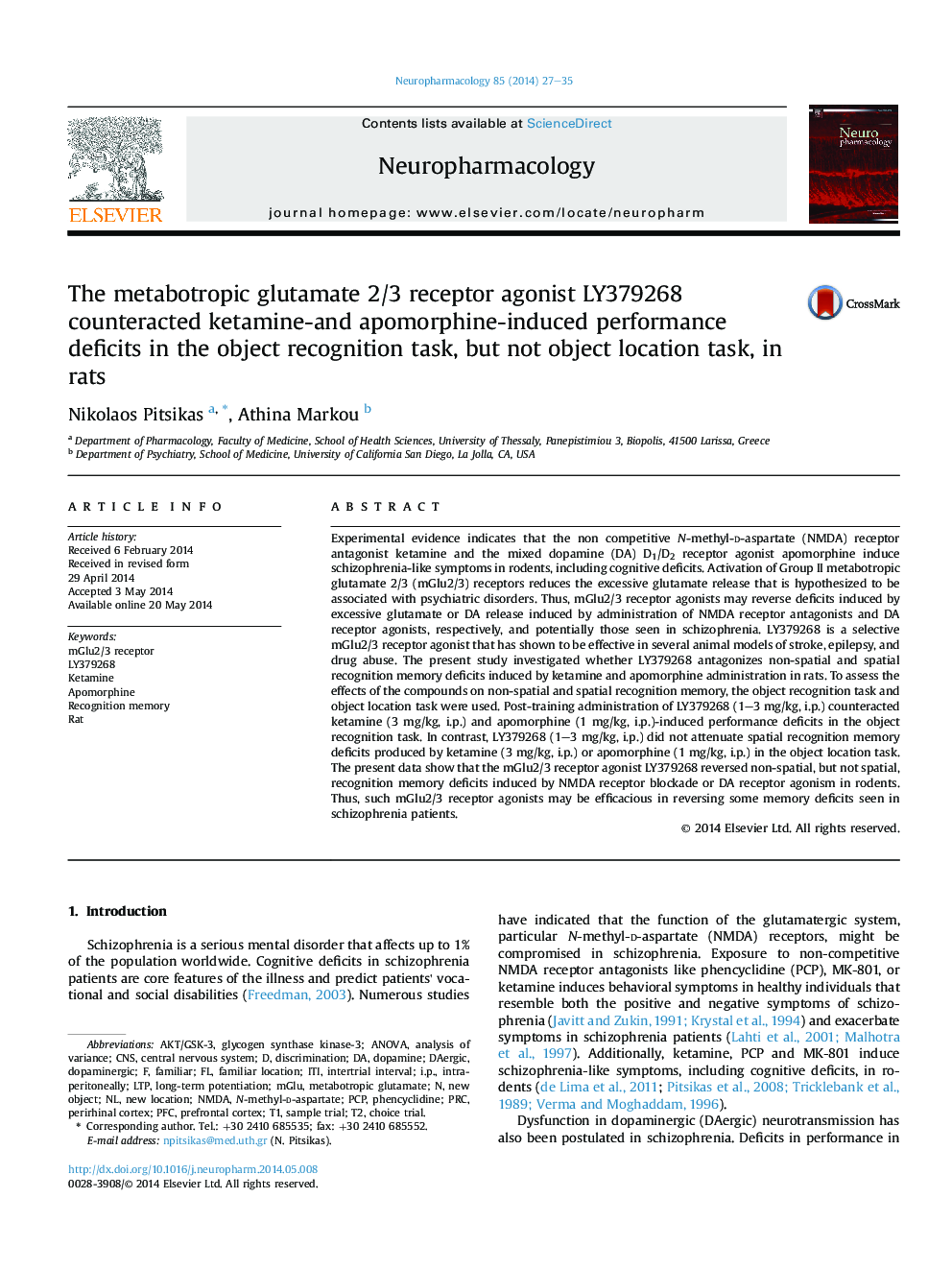| کد مقاله | کد نشریه | سال انتشار | مقاله انگلیسی | نسخه تمام متن |
|---|---|---|---|---|
| 5814383 | 1556629 | 2014 | 9 صفحه PDF | دانلود رایگان |
عنوان انگلیسی مقاله ISI
The metabotropic glutamate 2/3 receptor agonist LY379268 counteracted ketamine-and apomorphine-induced performance deficits in the object recognition task, but not object location task, in rats
دانلود مقاله + سفارش ترجمه
دانلود مقاله ISI انگلیسی
رایگان برای ایرانیان
کلمات کلیدی
DAergicmGluPFCLY379268mGlu2/3 receptorITIN-methyl-d-aspartatePCPPRCi.p.NMDAFamiliar - آشناApomorphine - آپومرفینDiscrimination - تبعیضanalysis of variance - تحلیل واریانسANOVA - تحلیل واریانس Analysis of variancelong-term potentiation - تقویت درازمدتLTP - تقویت طولانی مدت یا LTP Recognition memory - حافظه تشخیص یا شناختIntraperitoneally - داخل صفاقیCNS - دستگاه عصبی مرکزیDopamine - دوپامینDopaminergic - دوپامینرژیکcentral nervous system - سیستم عصبی مرکزیintertrial interval - فاصله بین فضاییPhencyclidine - فن سیکلیدین، گرد فرشتهprefrontal cortex - قشر prefrontalperirhinal cortex - قشر پریحینالRat - موش صحراییKetamine - کتامینMetabotropic glutamate - گلوتامات متابوتروپیکglycogen synthase kinase-3 - گلیکوزین سنتاز کیناز 3
موضوعات مرتبط
علوم زیستی و بیوفناوری
علم عصب شناسی
علوم اعصاب رفتاری
پیش نمایش صفحه اول مقاله

چکیده انگلیسی
Experimental evidence indicates that the non competitive N-methyl-d-aspartate (NMDA) receptor antagonist ketamine and the mixed dopamine (DA) D1/D2 receptor agonist apomorphine induce schizophrenia-like symptoms in rodents, including cognitive deficits. Activation of Group II metabotropic glutamate 2/3 (mGlu2/3) receptors reduces the excessive glutamate release that is hypothesized to be associated with psychiatric disorders. Thus, mGlu2/3 receptor agonists may reverse deficits induced by excessive glutamate or DA release induced by administration of NMDA receptor antagonists and DA receptor agonists, respectively, and potentially those seen in schizophrenia. LY379268 is a selective mGlu2/3 receptor agonist that has shown to be effective in several animal models of stroke, epilepsy, and drug abuse. The present study investigated whether LY379268 antagonizes non-spatial and spatial recognition memory deficits induced by ketamine and apomorphine administration in rats. To assess the effects of the compounds on non-spatial and spatial recognition memory, the object recognition task and object location task were used. Post-training administration of LY379268 (1-3Â mg/kg, i.p.) counteracted ketamine (3Â mg/kg, i.p.) and apomorphine (1Â mg/kg, i.p.)-induced performance deficits in the object recognition task. In contrast, LY379268 (1-3Â mg/kg, i.p.) did not attenuate spatial recognition memory deficits produced by ketamine (3Â mg/kg, i.p.) or apomorphine (1Â mg/kg, i.p.) in the object location task. The present data show that the mGlu2/3 receptor agonist LY379268 reversed non-spatial, but not spatial, recognition memory deficits induced by NMDA receptor blockade or DA receptor agonism in rodents. Thus, such mGlu2/3 receptor agonists may be efficacious in reversing some memory deficits seen in schizophrenia patients.
ناشر
Database: Elsevier - ScienceDirect (ساینس دایرکت)
Journal: Neuropharmacology - Volume 85, October 2014, Pages 27-35
Journal: Neuropharmacology - Volume 85, October 2014, Pages 27-35
نویسندگان
Nikolaos Pitsikas, Athina Markou,